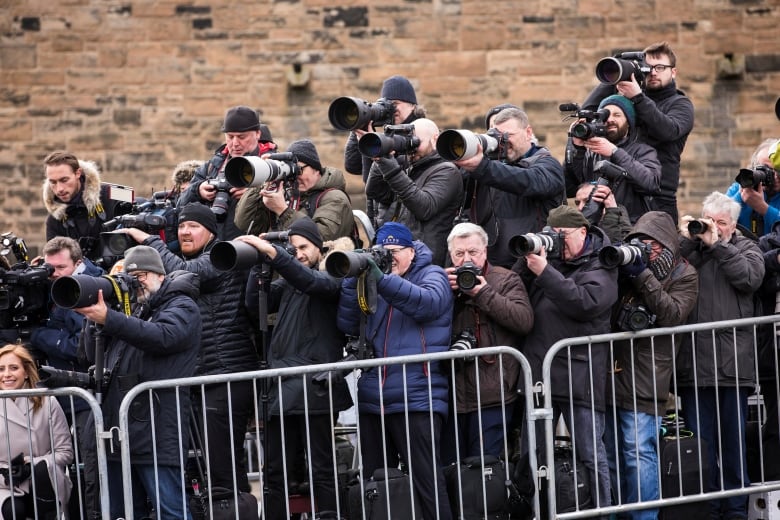Landon Jones helped create a fame-obsessed culture. Now he has regrets

The Sunday Magazine21:00Landon Jones helped create our celebrity-obsessed culture. Now he has regrets
Landon Jones says he regrets some of the ways he has covered celebrities, and how that has shaped people’s view of fame.
Jones, who worked for People magazine — including eight years as managing editor — says people used to be famous for their accomplishments, but now they’re famous just for being famous.
People magazine, which started in 1974, specializes in telling the stories of celebrities, including special editions such as Best & Worst Dressed and Sexiest Man Alive.
His new book, Celebrity Nation: How America Evolved into a Culture of Fans, tackles that topic. Jones spoke with The Sunday Magazine guest host David Common about the history and psychology of celebrity, and how he thinks celebrity news needs to change.
I think back to when you started working at People, when it was just being launched, it was back in the mid ’70s and you write that at the time the word celebrity wasn’t even really in your vocabulary. Is that actually the case?
That’s actually the case. We never used it. We thought we were writing a magazine that would describe extraordinary people of all kinds. They could be athletes, they could be politicians, they could be writers, they could be a radio host, they could be so many things. They could also be ordinary people who had done extraordinary things.
But we did not write or use the word celebrity at all. It came later with the arrival of the television celebrities in the ’70s.
Do you remember a moment where things really changed for People magazine?
The first 17 issues of People all failed. They did not make rate base, as advertisers call it. But then we put a TV star on the cover for the first time, and his name was Telly Savalas from a show called Kojak. And he was shirtless.
It sold gangbusters and the women all wrote in and said, “well, what about the rest of him?” And that told us something about celebrity and the name recognition and face recognition and in his case, chest recognition.
You write about some of the rules that an early editor came up with at People for who to put on the cover. And I want to quote your book. “Young stars sell better than old. Rich is better than poor. TV is better than movies. Anything is better than politics.” And then there’s another rule, more troubling, “write about a woman with a problem.” Why that rule?
Yes, that was my rule. And the more you put a young woman with a problem on the cover, the more people wanted to read it and the more issues were sold.
And so the quintessential example of that was Princess Diana, who was a young woman with a problem, and the problem was her marriage. But people were consumed with interest in her because she was indeed that.
We know the terrible effect that fame and the desire to constantly have photos and gossip and information [had] on Princess Diana, the celebrity paparazzi even extending into her children’s lives…. So I’ve got to ask you, Lanny, in retrospect, do you have qualms about the way celebrity journalism has gone about its business?
Yeah, I have qualms about it. I feel a certain mea culpa about it, that we’re not offering people heroes and we’re not offering the experience of community.
I mean, one of the things that the social scientists have taught us is that the deeper a person is a celebrity worshiper, the less likely they are to vote or to be active in the community.
WATCH | Prince Harry and Meghan blame paparazzi for ‘near catastrophic’ car chase
Prince Harry and his wife, Meghan Markle, claim paparazzi in New York City subjected them to a two-hour car chase that could have ended in a catastrophic crash, after they left a public event with Markle’s mother.
And so their fans sort of have parasocial relationships, but it’s only with celebrities, [it’s] not with their neighbours. And so people are tweeting alone, as I say. And there’s a sort of sad irony that happens. And journalists have a job to kind of hold up a better example.
So we’re talking about the effect on the celebrity. But what about the effect on fans of all of this celebrity worship on everyday people?
The fans could also suffer mental stress because they want to be close to someone and they’re not. So they tend to spend more … in an effort to catch up.
They have poor body image, in [particular] women have poor body images psychologically because of their obsession with celebrity, they’ll have a standard that almost nobody can live up to. And so that hurts them terribly.
They become self-absorbed and as I’ve been saying to what happens in your community, you don’t vote, you’re not a member of the community.
I think a lot of the polarization we experience all around the world these days is between the intense individualism that fans have and feel like they’re entitled to, as opposed to working and helping your community and other people.

Now, if we look, of course, at the past decade plus, the rise of social media has just poured gasoline on some of these trends. There’s more and more celebrities online, including micro celebrities, influencers…. You say that in retrospect, in reflection, that you feel in some way responsible. You were at the helm of People, that was a main driver of the celebrity journalism world.
Yeah. At the time we said, well, we’re not responsible for the actions of our imitators. But then, in a way, we were. And so we glorified fame and wrote about it because people paid money to read about them.
And so it becomes a conspiracy of sorts, between the media and the marketers who buy the advertising to support the media, to get access to the readers, who are eyeballs, who want to read about celebrities.
And so there’s this sort of interlocking conspiracy of media, marketers, celebrities themselves … and a willing public who consume them.

So if you could get incoming generations, younger generations, people in their 20s and 30s today, what would you say to them to try to derail what you’re describing?
I would say focus on people who are not self-absorbed and people who are looking for a greater good. That would be what I would say to those worshipers.
And to celebrities themselves, I would say just be aware and be careful of the impact of what you are doing on other people, but also on yourself. And so there’s a certain amount of caution.
And, pay attention to the people who are doing good. And so I try to find some people. Greta Thunberg on climate change and Maria Ressa on human rights in the Philippines and even people you wouldn’t expect. People like Roger Federer, the tennis player who raises money for school children in South Africa, which I had barely known about.
But these things are under publicized, and I wish the media would say more about the good works that some celebrities do.





